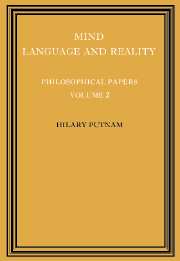Book contents
- Frontmatter
- Contents
- Dedication
- Introduction
- 1 Language and philosophy
- 2 The analytic and the synthetic
- 3 Do true assertions correspond to reality?
- 4 Some issues in the theory of grammar
- 5 The ‘innateness hypothesis’ and explanatory models in linguistics
- 6 How not to talk about meaning
- 7 Review ofThe concept of a person
- 8 Is semantics possible?
- 9 The refutation of conventionalism
- 10 Reply to Gerald Massey
- 11 Explanation and reference
- 12 The meaning of ‘meaning’
- 13 Language and reality
- 14 Philosophy and our mental life
- 15 Dreaming and ‘depth grammar’
- 16 Brains and behavior
- 17 Other minds
- 18 Minds and machines
- 19 Robots: machines or artificially created life?
- 20 The mental life of some machines
- 21 The nature of mental states
- 22 Logical positivism and the philosophy of mind
- Bibliography
- Index
11 - Explanation and reference
Published online by Cambridge University Press: 12 January 2010
- Frontmatter
- Contents
- Dedication
- Introduction
- 1 Language and philosophy
- 2 The analytic and the synthetic
- 3 Do true assertions correspond to reality?
- 4 Some issues in the theory of grammar
- 5 The ‘innateness hypothesis’ and explanatory models in linguistics
- 6 How not to talk about meaning
- 7 Review ofThe concept of a person
- 8 Is semantics possible?
- 9 The refutation of conventionalism
- 10 Reply to Gerald Massey
- 11 Explanation and reference
- 12 The meaning of ‘meaning’
- 13 Language and reality
- 14 Philosophy and our mental life
- 15 Dreaming and ‘depth grammar’
- 16 Brains and behavior
- 17 Other minds
- 18 Minds and machines
- 19 Robots: machines or artificially created life?
- 20 The mental life of some machines
- 21 The nature of mental states
- 22 Logical positivism and the philosophy of mind
- Bibliography
- Index
Summary
General significance of the topic
In this paper I try to contrast realist theories of meaning with what may be called ‘idealist’ theories of meaning. But a word of explanation is clearly in order.
There is no Marxist ‘theory of meaning’ but there are a series of remarks on the correspondence between concepts and things, on concepts, and on the impossibility of a priori knowledge in the writings of Engels (cf. Engels, 1959) which clearly bear on problems of meaning and reference. In particular, there is a passage in which Engels makes the point that a concept may contain elements which are not correct. A contemporary scientific characterization of fish would include, Engels says, such properties as life under water and breathing through gills; yet lungfish and other anomalous species which lack these properties are classified as fish for scientific purposes. And Engels argues, I think correctly, that to stick to the letter of the ‘definition’ in applying the concept fish would be bad science. In short, Engels contends that:
Our scientific conception (I would say ‘stereotype’) of a fish includes the property ‘breathing through gills’, but
‘All fish breath through gills’ is not true! (and, a fortiori, not analytic).
I do not wish to ascribe to Engels an anachronistic sophistication about contemporary logical issues, but without doing this it is fair to say on the basis of this argument that Engels rejects the model according to which such a concept as fish provides anything like analytically necessary and sufficient conditions for membership in a natural kind.
- Type
- Chapter
- Information
- Philosophical Papers , pp. 196 - 214Publisher: Cambridge University PressPrint publication year: 1975
- 27
- Cited by



